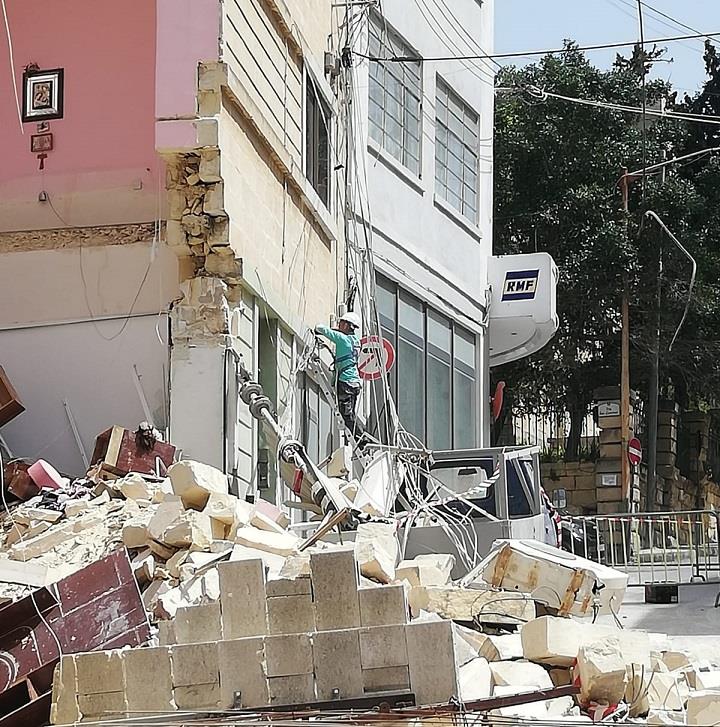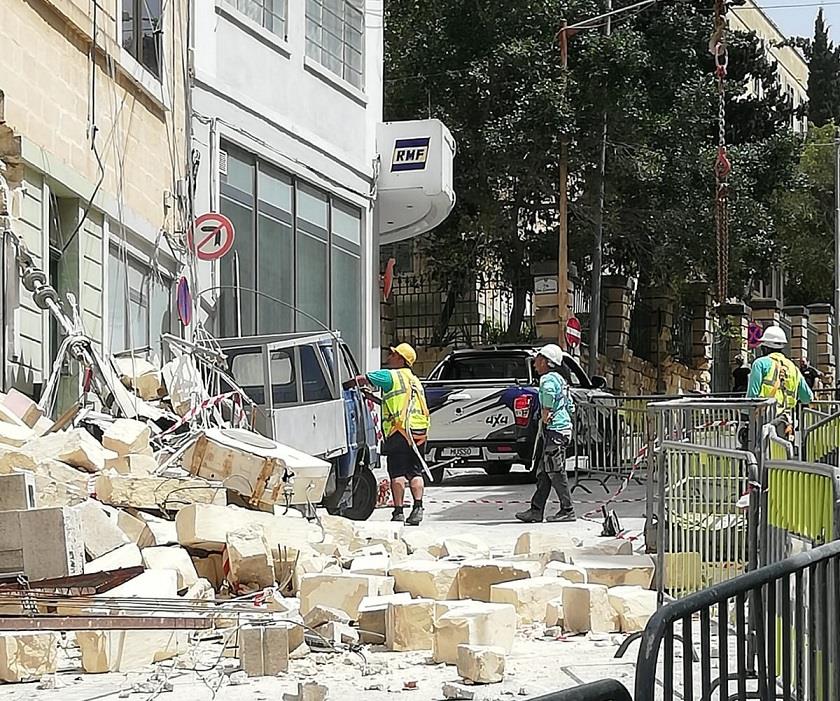Four years after witnessing the collapse of the apartment building which Caroline Micallef and her husband called home, they are left in the dark as to why a magisterial inquiry was never appointed.
The only reason given to her, by then Justice Minister Edward Zammit Lewis, was that in her case, a magisterial inquiry was not appointed as nobody had been injured or killed.
When the collapse happened that night, a magistrate did show up on site, but no magisterial inquiry was ever appointed, Micallef said.
Micallef was approached by The Malta Independent on Sunday after being spotted and caught on our camera (photo above) next to Isabelle Bonnici during the vigil that was held on Monday to commemorate the death of Jean Paul Sofia. The 20-year-old died when a building under construction collapsed in Kordin last December. A magisterial inquiry into the tragedy was concluded on Friday.
The Guardamangia incident happened on 24 April 2019, just after 10pm, at Guardamangia Hill, when an apartment block, adjacent to a construction site, collapsed, with its residents out on the street as witnesses.
That night, Micallef’s husband, Winston, had already gone to sleep, while she stayed up a little longer.
As Micallef headed to bed, she heard a loud, rumbling noise coming from the walls of their apartment.
Micallef woke her husband up, when a second, even larger noise roared the whole building. They both saw huge “hair-line cracks” opening in the walls and ceilings.

Hurriedly, still in her sleepwear, Micallef and her husband picked up their dog, the house keys and her phone, before rushing down the stairs, out of the building and into the middle of the road, joined by their neighbours.
They then witnessed the building give way and collapse, just 10 minutes later. Micallef described her story from that point onwards to The Malta Independent on Sunday.
Apart from the fact that no magisterial inquiry had been appointed, Micallef also said investigations by the police had also not been conducted.
“The police had come, only on the night of the incident. They had seen it collapse, as we had escaped the building and in those few minutes, we had called the police,” Micallef said.
It was around 1am when they were taken to the station and the police spoke to the victims of the collapse outside in the corridors.
“Once the developers of the construction site came, the police entered an office with them and shut the door behind them. I thought that was very vile,” Micallef said.

After three months of complete silence after the incident, neither the developers of the adjacent construction site nor the insurance company, had contacted them. Micallef said that they were left not knowing what will happen to them.
“First you cause the collapse of a person’s home, almost kill them, then you leave them hanging like that?” Micallef said, expressing her anger of the way things were handled.
Furthermore, the insurance company initially did not want to demolish the whole building and rebuild from the ground up, but rather it said that the new rooms had to be built on top of the part of the building which did not collapse.
“They wanted us to move in like that, they also said that the part of the building which did not collapse was safe. The incident happened in April, and in December, there were some hairline cracks again,” Micallef said, adding that they did not want to concede.
“I had told them that I would not take the risk, and that the report of our architect clearly stated that the building had to be demolished – the report was clear. It needed to be demolished fully and rebuilt from the ground up,” Micallef said.
She continued that she did not want to be moving furniture and see another hairline crack opening in the wall and risk killing someone.

“Below my apartment there is the Transport Malta Offices, many of them would be doing theory exams and are youths. If something happened, I would then be the one responsible and risk another tragedy. I would get the blame, then,” Micallef said.
The Covid-19 pandemic arrived and Micallef had to open a case in Court on the disagreement with the insurance company.
It was the first time the Courts had closed due to the pandemic, so Micallef had to open a case with urgency.
“Once we got in, and there was the magistrate, the insurance company then admitted that they will accept the demolishing and rebuilding of the building,” Micallef said, incredulously.
She could not understand why there was that obstacle of “unnecessary hard-headedness”. Otherwise, they would not have needed to open a case, would have avoided all the extra expenses and would have done things properly, Micallef said.
Nowadays, Micallef and her husband have moved back into their home, marking two years since moving back next month, after much struggle, running to and from court, dealing with lawyers and architects.
Micallef received compensation for the things they had lost in the collapse. As for compensation for the trauma they both underwent, the couple received nothing.

Speaking about the trauma she endured, Micallef said she spent two years and a half going to a psychologist.
“Despite having now stopped, I cannot tell you that I’m 100% well, as I’m trying to walk on my own two feet. But I have gone through a period where I had wanted to take my life,” Micallef said.
She said that she had undergone immense stress and felt like she could not take it any longer. Micallef said she did not want to keep living. Both herself and her husband felt like they were surviving, rather than living.
“We did not have to go through all of this. We were here, at home, not disturbing or bothering anyone,” Micallef continued.
She said that the incident still affects her and loud noises cause flashbacks of the night of the collapse.
“It was like watching a movie, and there is an earthquake, and you see the ground cracking open,” Micallef continued, saying that she could not believe her eyes as she saw the walls and ceilings of her home crack open before her eyes.
Micallef circled back to her anger, as to why a magisterial inquiry was never appointed in her home’s collapse.
She said that she read Janet Zahra Walker’s case, whose family had to evacuate their apartment building in June 2019, after a wall collapsed in their apartment building, which is adjacent to a construction site in the same neighbourhood, in Guardamangia.
A magisterial inquiry had been appointed, yet nobody died, nor was anyone injured in that case.
“Half of my building had collapsed. To be given that answer did not make any sense to me, that a magisterial inquiry was not done because nobody died. There was no further mention of it,” Micallef said.
“First, we had the first slap in the face, watching our own home collapse along with all our personal things, leaving us with nothing. Then, there was the second slap in the face, that a magisterial inquiry was not appointed,” she continued.
The police had also only spoke to Micallef the night of the incident and two years later to inform them that the case they opened on the insurance company hurdle, was being closed.
This posed the question of, “why are some magisterial inquiries appointed and others not?”

Micallef said that is where she questions things – “why did they appoint one for another case and not for mine, under the same circumstances?”
Micallef said that they were lucky enough to have escaped the building, for which she thanks God.
“Otherwise, we would have ended up like Jean Paul Sofia, and Miriam Pace, for sure. Three floors would have fallen over us,” she said.
Asked if authorities or government are doing enough to address these incidents, as well as the construction sector, Micallef said that while she does not understand in politics and its processes, she believes that there should be all the means possible to protect the individual.
“Whether it is a construction site with homes next to it or an individual working at a construction site, there should be all the means to protect them,” Micallef said.
She also had harsh words for developers who only care about the money they pocket, but not about the people they affect, nor the damage they cause.
“This incident took 40 years of my life – 40 years of memories, 40 years of everything. But the developers do not care, we are peanuts to them,” Micallef said.
“We felt like giving up. My husband used to tell me that he thinks we have lost what was ours and we will not get it back. I used to say otherwise, that our home will come back,” she said.
“It was very hard and we fought hard for it, if it were up to them (the developers), nothing would have happened,” Micallef continued.

Micallef attended last Monday’s vigil for Jean Paul Sofia’s death, standing at the frontlines at the foot of Castille’s steps.
“When Jean Paul’s mother arrived at the vigil, I hugged her and told her that I am also a victim of construction, as she is. But she has suffered more, she lost something I did not lose, her son, who cannot be replaced,” Micallef said.
She said that despite going through all this, despite being small, she still gained the strength of a lion in certain moments. In fact, Micallef, despite not being a public person, had the courage to speak in several protests, as well as on Xarabank.
These incidents fall on deaf ears, Micallef said, accusing developers of "bullying the weak".
“I am content with what I have, we were never rich and we will never be rich. We have always gone to work, living a simple life. All we wanted is to have what we used to have, so we can re-start our life,” Micallef said.
Do you feel like justice was done? Micallef was asked.
“For me, justice was not done. Because there was no inquiry and things were not done how they were meant to be done, then no, justice was not done,” Micallef said.